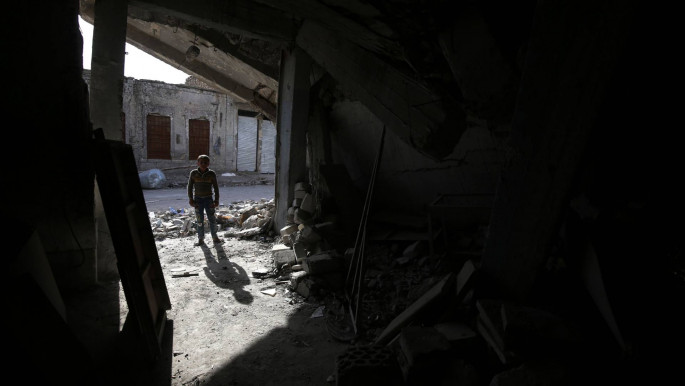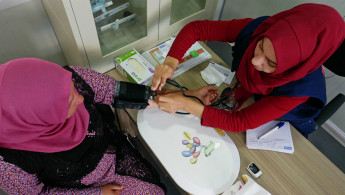Government neglect leaves doctors in Iraq at risk from 'revenge' attacks
Thousands of tweets launched the hashtags #save_iraq_doctors and #HelpIraqiDoctors, in response to the increasing calls casting blame on physicians following the death of three-year-old Rafif Haider in Diwaniya Hospital.
When Rafif's family brought the child on July 24, unable to breath after swallowing walnut and blocking her airway, the hospital informed the family that the bronchoscope needed to save the child was not available.
The only surgeon in the hospital was on leave, but in a phone call, he advised to transfer the patient to the nearest hospital where the devise was available in Baghdad, three hours away from the Diwaniya city.
One of the hospital staff, who requested to remain anonymous, explained that they could not send the child in the ambulance without completing the needed papers and taking the authorisation from the receiving hospital.
With the delays in transferring procedures and lack of resources, Rafif did not survive her critical condition.
Following the death of the child, medical professionals in Diwaniya became the target of a demonising campaign as family members and residents of the city cast the blame on the surgeon not present in the hospital to help the deceased child, as well as the rest of the hospital staff who were present, for delaying the transferring procedures.
The campaign became more intense when the Health Department in the city dismissed the surgeon and other staff members, blaming them officially for the death of the child.
 |
|
| Read also: The Iraq Report: Thousands of children tortured by Iraqi authorities |
In fear of actual attacks, private practitioners and pharmacists decided to start a strike protesting the constant demonisation of medical professionals.
Dr S. R, private gynaecologist in Diwaniya, explained that, "I had to close my clinic. People were angry and the government chose to blame the physician who was on leave that day and his presence would not have changed the situation. The hospital lack most of the necessary equipment."
S. R. added that she had to quit her job in public hospitals because she was at constant risk of being attacked if anything would happen to a patient she was treating, asserting that many of her colleagues had left to escape potential risks.
Social media posts and hashtags tried to highlight, not just the risks doctors in Iraq face on daily bases. Social media bloggers also tried to highlight that most of Iraqi hospitals were not equipped with needed medical devises, forcing Iraqis with deadly diseases to seek treatment in neighbouring countries.
Minister of Health, Alaa al-Alwan mentioned in January 2019, that the budget allocated for the ministry did not meet the needed minimum and did not amount to 10 percent of what other Arab countries spend on the health sector.
Al-Alwan also noted that in 2018, hospitals were provided with only 12 percent of their needs of medicine and medical equipment.
While state-owned hospitals were under-equipped, private hospitals and clinics were overpriced, said Ahmed Khalil, university lecturer in Qadisiya University.
"Medical care has been widely commercialised in Iraq after 2003. Families with better financial means would not seek medical care in state-owned hospitals, where patients would wait hours and at the end would be told the medication they needed was not available," Khalil explained.
He added that private clinics and hospitals have become the first option for Iraqis which made private practitioners take advantage of the situation and raise their fees.
To protect medical professionals against increasing risks and constant attacks, the Judicial Council issued instructions against vengeful attacks by patient's family members and to not hold doctors accountable for the death of patients.
However, Omar Hassan, an Internal Medicine physician based in Oman, explained that these instructions remained inactive and that police forces could not protect him or his colleagues from constant attacks by patient's family members.
Hassan also explained that when a hopeless case came to a hospital, "Some doctors would refrain from treating it in fear of vengeful family members who might blame the treating doctor for the death of their patient".
Falih al-Ziyadi, member of health committee in the Iraqi parliament, told Baghdad Today, that the lack of safe environment for doctors and lack of equipment needed for diagnosis and treatment drove doctors to immigrate.
Ziyadi also explained that the law to protect Iraqi doctors had not been activated yet though it had been authorised by the previous parliament.
In 2018, Ministry of Health announced that 57 percent medical care workers had been assaulted, 55 percent of whom were assaulted verbally, while nine percent physically and six percent had been assaulted by vengeful tribes. The Ministry also mentioned that more 20,000 doctors had left the country since 2003.
The hashtags in support of the doctors in Iraq continue not only to highlight the risk medical professions face everyday in the country, but also the deteriorating medical care available to citizens.
Follow us on Twitter: @The_NewArab


![President Pezeshkian has denounced Israel's attacks on Lebanon [Getty]](/sites/default/files/styles/image_684x385/public/2173482924.jpeg?h=a5f2f23a&itok=q3evVtko)



 Follow the Middle East's top stories in English at The New Arab on Google News
Follow the Middle East's top stories in English at The New Arab on Google News


